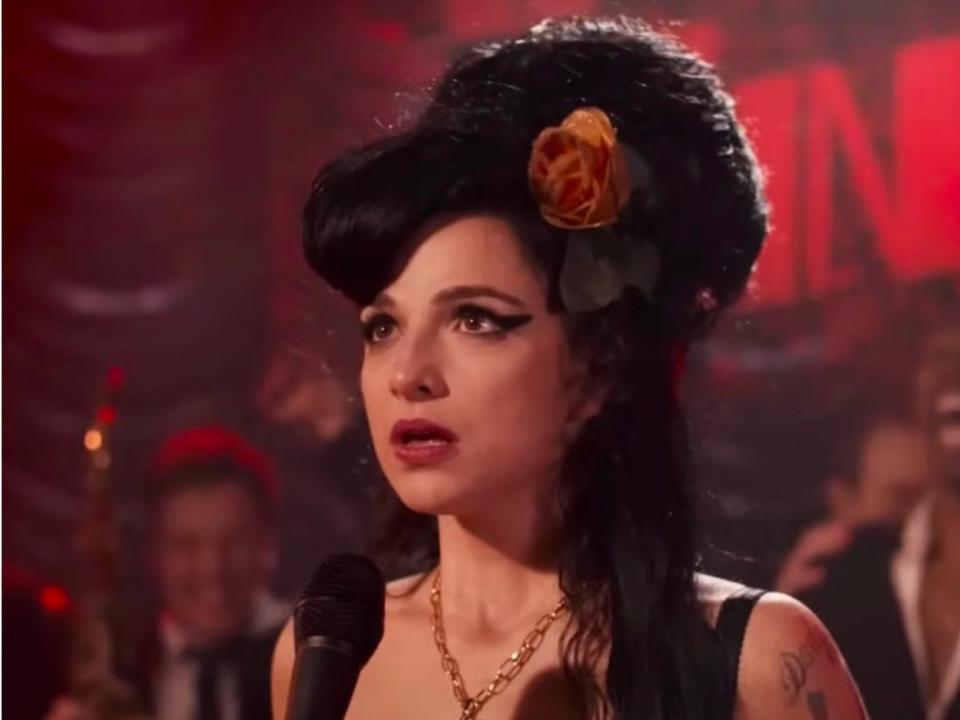Back to Black is a brutally disappointing Any Winehouse biopic

Those of a certain age might be thinking it’s too soon for a biopic about Amy Winehouse. Incredibly, it’s almost thirteen years since she died, succumbing to alcohol poisoning after a period of detox.
Compared to Elvis, whose first biopic was just two years after his death, that’s positively restrained. A tabloid target for most of her career, in death murals and statues demonstrate how much Winehouse’s music and style meant to people. Her rise and fall seem like fertile ground for a gripping film, but filmmaker Sam Taylor-Johnson (Nowhere Boy, Fifty Shades of Grey) falls well short of expectations.
Back To Black charts Winehouse’s life from just before the release of her first album, Frank, through to the days prior to her death. Played by British actress Maria Abela, Amy is shown to be passionate about the music and fashion of the 60s, inspired by her beloved grandmother Cynthia (Leslie Manville). Her singing soon gets the attention of labels, and success follows, but Winehouse’s determination to live her songs sees her shun the studio and run into the arms of future husband Blake Fielder-Civil (James O’Connell). As the hits follow, her personal life spirals out of control.
Let’s start with the good stuff. Abela is very convincing in the lead, mimicking Winehouse perfectly through mannerisms and vocal talent (the star trained to sing the songs herself, and nails it every time). She isn’t given a lot to work with in terms of material, but if ever a performance captured the soul of a person, it was hers. She also has an endearing connection with Manville, in a small but meaningful performance as the glamorous gran who shares cigarettes and gossip with her.
The real Back to Black culprits are Matt Greenhalgh’s script and Taylor-Johnson’s direction. Both boil down complex issues to shots and dialogue that are subtle as a pint glass to the face. Instead of talking about why she likes jazz, Abela rattles off the names of Sixties icons without context. Winehouse’s eating disorders are covered by Mitch muttering “you look a bit thin”, while shots of Amy stumbling through the rain following some tragic news have all the hallmarks of a cheesy TV film. If you came here to get inside the head of the singer, you’ll be bitterly disappointed.
There are two main directions one might have gone when portraying the singer’s life: her talent as an artist, or the personal problems that plagued her. The film seems curious about neither, only showing snippets of the creation of songs like Back To Black or the all-conquering Rehab. Meanwhile, there’s no sense of knowing who Winehouse is, or what drove her to addiction.
In Asif Kapadia’s 2015 documentary Amy, Mitch is not given a sympathetic portrayal, asking whether he was keener to pursue the limelight than safeguard his daughter. Obviously, this estate-endorsed drama wouldn’t do that, with Eddie Marsan portraying a flawed but loving patriarch. Blake Fielder-Civil, played with swagger by O’Connell, also comes out fairly clean, separating his addiction from hers despite the real man claiming in the past that it was him who introduced her to heroin.
All Winehouse’s issues are portrayed as self-generated, a self-destructive impulse that seemingly comes from nowhere but was exacerbated by the swarm of nameless paparazzi that enter at appropriate moments. Nothing adds up, leading to two hours of melodrama that couldn’t seem further from reality.
Back To Black insists on ending on a positive note, one of many bizarre choices in a baffling film. There was an opportunity to explore the price of genius, the toll of addiction, or the toxic nature of tabloid attention. Instead, Taylor-Johnson skips through the headlines. You come away from the film aware that Winehouse was an amazing singer, loved a man named Blake, and had issues with drugs. Anything beyond these surface facts is missing. Biopics don’t have to be documentaries, but the London legend deserved better.

 Yahoo Finance
Yahoo Finance 